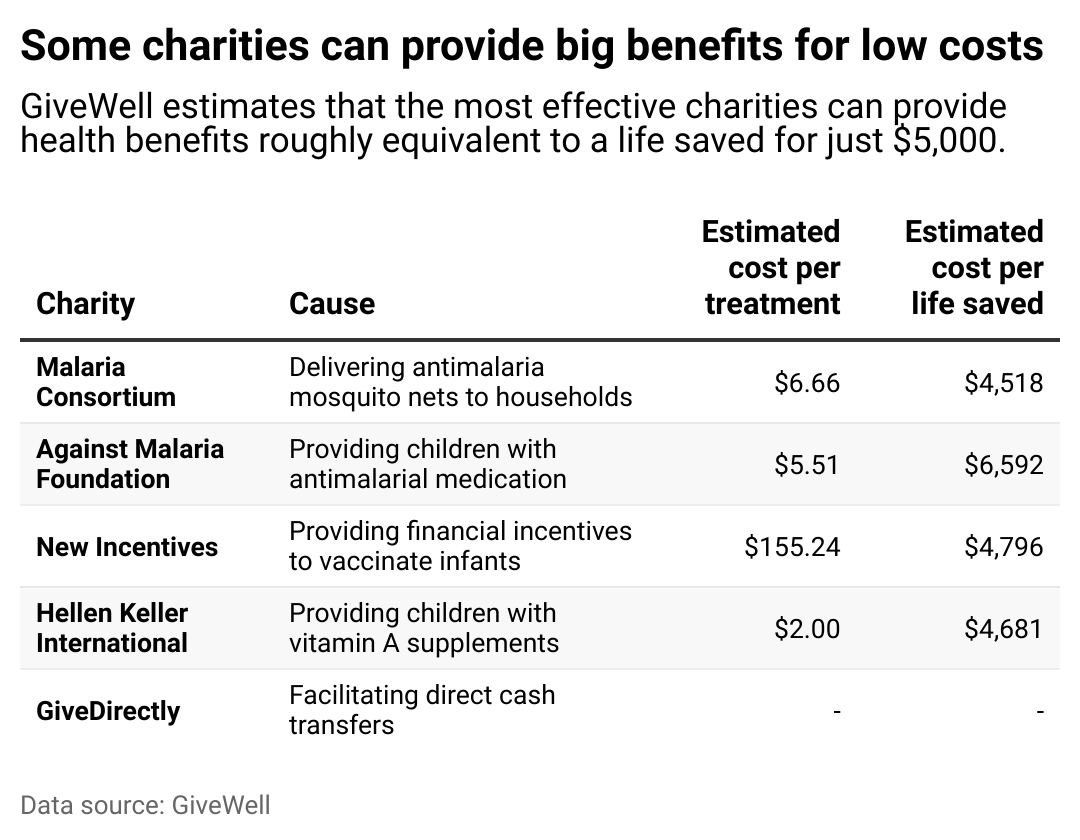Nonprofit Finder examined data from GiveWell to see what charities offer donors the most bang for their buck.
This item is available in full to subscribers.
To continue reading, you will need to either log in to your subscriber account, below, or purchase a new subscription.
Please log in to continue |

The holiday season is a busy time for charities. Driven by the spirit of the season, tax incentives, and reflections on achievements and how to give back, estimates show nonprofits earn up to nearly a third of their revenue in December.
When it comes to giving back, Americans are among the most generous people in the world. According to the Charities Aid Foundation, 3 in 5 (61%) Americans donated money to a charity in 2021, placing the country third on the World Giving Index for charitable giving, which ranks over 100 countries in terms of volunteering and monetary donations. In 2023, Americans gave a combined $557 billion to nonprofits, including recipients ranging from animal shelters to churches to universities, according to Giving USA's 2024 annual report.
However, not all charities are made equal. Some are much more efficient than others, while bureaucracy, overhead costs, and a lack of leadership can mitigate the impact of others. A lack of financial transparency, too, can make donors ill at ease, with recent charity scams promoting awareness about the importance of verifying charitable organizations.
However, by one estimate, only about 1 in 3 people who donate money conduct research before giving, according to estimates from Charity Navigator, which helps donors evaluate charities. To ensure their donations are making an impact, Americans can do their homework by checking an organization's IRS status, program spending, and fundraising efforts. While time-consuming, donors who have more of an analytical bent could consult a charity evaluator to ensure their money is being put to good use.
Nonprofit Finder examined data from GiveWell to see what charities have the most impact and can make a difference for the causes that matter most.

With greater expectations for transparency and growing awareness about charitable giving, more donors are turning to nonprofits to evaluate the nonprofits they hope to support.
GiveWell, for example, evaluates charities based on their cost-effectiveness. According to its academic research and interviews with organizations, some of the world's most cost-effective charities tend to focus on public health, particularly in majority-world countries, where donations can go further. The most effective charities can yield significant results, producing health benefits roughly equivalent to a life saved for every $5,000 in donations received, according to the organization's methodology.
Consider two of GiveWell's top charities that focus on combating malaria. The World Health Organization estimates the infectious disease kills around 600,000 people a year, primarily in Africa; children under the age of 5 are particularly vulnerable. Malaria Consortium distributes drugs aimed at preventing malaria infections at the cost of roughly $7 per treatment. Along with another recommended charity, the Against Malaria Foundation, they distribute insecticide-treated bednets. These nets, which cost around $5 each to deliver, are aimed at preventing mosquito bites, the main cause of malaria infections.
Another of GiveWell's recommended charities, Helen Keller International, takes a different approach, focusing on providing children with critical vitamin A supplements, which strengthen vision and prevent blindness. The cost per treatment is low at just $2.00. Preventing vitamin A deficiencies can lower the risk of diarrhea, measles, and other diseases. The last of GiveWell's recommended charities, New Incentives, offers a unique strategy by providing financial incentives for parents in Nigeria to vaccinate their infants against a wide range of diseases such as tuberculosis, hepatitis B, and measles.

Various models have emerged for evaluating efficacy. One way many economists advocate judging the efficacy of foreign aid (or, in this case, charities) is by comparing the interventions against simply giving recipients the money that was donated. GiveDirectly, for example, facilitates direct cash transfers. Historically, after accounting for operating costs, about 85% of money sent through GiveDirectly reaches its recipients. They present a good alternative to those who are wary of any analysis.
Other charity evaluators have different approaches. Animal Charity Evaluators assess nonprofits focused on improving animal welfare—particularly those raised for food. Meanwhile, Charity Navigator rates a very broad range of charities, including impact, finances, and impact on communities. CharityWatch focuses on nonprofits' financial efficiency, as well as vetting for any wrongdoing.
Ultimately, charitable giving is a highly personal decision. As many Americans seek to make an impact this holiday season, making informed decisions about where to donate can be just as important as deciding how much to give.
Story editing by Alizah Salario. Additional editing by Kelly Glass. Copy editing by Paris Close. Photo selection by Lacy Kerrick.
This story originally appeared on Nonprofit Finder and was produced and distributed in partnership with Stacker Studio.